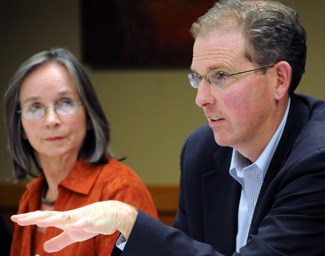
Sen. Peter Wirth, D-Santa Fe, discusses the creation of a state ethics commission Wednesday in Las Cruces. In the background is Rep. Mimi Stewart, D-Albuquerque. (Photo by Heath Haussamen)
Ethics commission could have 11 members, subpoena power under bill that could be proposed in January
Lawmakers who are crafting legislation that would create an independent state ethics commission decided Wednesday evening to propose that such a body have 11 members, and to give it subpoena power.
Some other key questions — the most significant being what degree of disciplinary authority such a commission would have — remain unresolved.
But several members of the Ethics Commission Subcommittee of the Courts, Corrections and Justice Committee said they made good progress at Wednesday’s meeting in Las Cruces in working through what have been some stumbling blocks for ethics commission proposals in recent legislative sessions.
The Senate has killed ethics commission bills for years, and now lawmakers are attempting to lay the groundwork for a bill that actually has a chance of passing in the regular session of the Legislature that begins in January.
In deciding Wednesday on the number of people who would make up an ethics commission, lawmakers agreed to propose 11. It would take eight of them to form a quorum or make any decision — including issuing a subpoena or making a determination in a case. That’s designed to ensure any decision made by the commission will be bipartisan.
Eight members would be appointed by lawmakers — two each from the House Democratic caucus, House Republican caucus, Senate Democratic caucus and Senate Republican caucus — and three would be appointed by the governor.
Of the three appointed by the governor, one would have to be a Democrat, one a Republican and one a registered voter who’s not a Democrat or Republican.
More discussion
There was some discussion about a nine- or 10-member commission, but in attempting to give enough appointment authority to the governor, the legislators agreed that an 11-member body was best. One idea they discussed would have had four members appointed by the House, four by the Senate and one by the governor.
“It’s just like an attack on the governor. He would never sign that bill anyway,” said Senate Majority Whip Mary Jane Garcia, D-Doña Ana.
Eric Vasquez, a senior policy analyst for Lt. Gov. Diane Denish who has been participating in the subcommittee’s discussions, agreed.
“It seems like the governor should have more stake in the game than just one member,” said Vasquez, whose boss is currently running for governor.
As for the members appointed by the Legislature, Sen. Cisco McSorley, D-Albuquerque, said he wanted them to be selected by all members, not just the leadership.
“I don’t feel currently that the leadership in the Senate represents the makeup of the Democratic caucus,” McSorley said.
The handful of lawmakers on the subcommittee also agreed that people who have contributed to political campaigns and had state contracts in the past shouldn’t be excluded from being appointed to the commission — but once they’re appointed to the commission, they should no longer be allowed to contribute to campaigns or have state contracts.
Though the issue of whether to give such a commission subpoena power has been a sticking point in the past, discussion of it was relatively brief on Wednesday, as all members present agreed that such a commission should have such authority. Like the state’s Judicial Standards Commission, such an ethics commission would have to ask a district court judge for final approval to issue a subpoena.
Unresolved issues
Lawmakers left two significant issues unresolved. The biggest is what authority the commission would have to punish unethical behavior with reprimands or censures. Lawmakers agreed at a previous meeting that an ethics commission would govern ethical conduct in the legislative and executive branches, but different rules could apply to different people within the branches.
For example, a provision in the state Constitution says only the Legislature can take certain kinds of action against lawmakers. And there are details that need to be worked out about how an ethics commission investigation of a state employee would work in the context of personnel laws.
In addition, lawmakers left a transparency question unresolved: When the ethics commission finds a violation by a legislator, should that fact be made public then, before the case is referred to the appropriate legislative committee for potential action, or should public notification only happen if the legislative committee decides to take action?
While some lawmakers said the situation shouldn’t be made public unless the Legislature takes action — except for a generic notification that the ethics commission had referred an unspecified case to a legislative committee — at least one senator disagreed.
Sen. Linda Lopez, D-Albuquerque and a candidate for lieutenant governor, said a finding that a lawmaker had violated an ethical code should be made public when issued by the ethics commission.
“The public has a right to know who this person is,” Lopez said.
The legislative committee is meeting again in Las Cruces on today and Friday. Subcommittee members said they may try to find time to meet again while here to hash out more details. If that doesn’t happen, they’ll meet again in about a month.